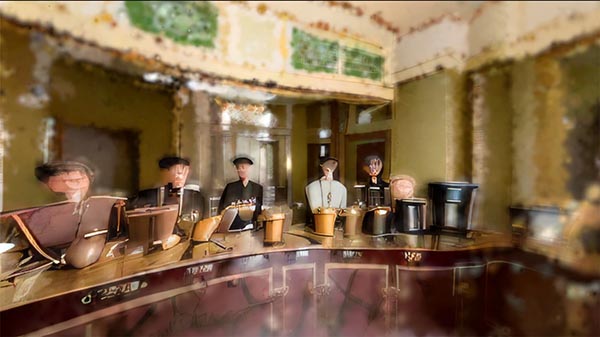Virtual Reality experience Tulpamancer sees an AI craft an experience for you in real-time. At Venice Immersive 2023, I discovered that I’m too cynical for it.
Tulpamancer was one of the most sought-after Virtual Reality experiences at the 2023 Venice Film Festival, and it’s not hard to see why. This intriguing VR installation from directors Marc Da Costa and Matthew Niederhauser is tailor made to each participant, as it uses your memories and desires to craft a world that is made for you, ultimately getting you to think about your past, present, and future. And that’s exactly what this Virtual Reality work did for me when I experienced it at Venice Immersive, the Biennale’s XR strand, earlier this month. But as it turns out, I might be a little too cynical for Tulpamancer.
The premise behind what Da Costa and Niederhauser have conceived is both fascinating and timely, not to mention groundbreaking, technologically speaking. The real innovation behind Tulpamancer is that, like festival programmers Liz Rosenthal and Michel Reilhac told XRMust, it processes information in-real time. This experience takes part in two stages: first, you’re asked to sit at a very old-looking computer, where a series of questions pop up on the screen that you have to answer. Then, the artificial intelligence to whom you’ve just opened up creates a personalised narrative in VR for you, with a voice over and a set of videos that are meant to affect you on a personal, more intimate level. This means that what you’ll experience is not only unique to you, but has also partly been created by you.
Needless to say, going into the installation, I was very excited. As I approached the “Tulpa” computer and prepared to answer its questions, I resolved to be as truthful and detailed as I could, in order to help the AI come up with something that reflected my experiences. First, it asked me about the room where I had woken up that morning, and I told it all about the noisy house my friends and I were renting for the festival, and how frenetic my morning had been, since I had just completed an interview. It asked about the last stranger I met, and I recollected said interview, where I felt like I’d really established a connection with the director but didn’t have enough time to do so with the other interviewees, which is why my social anxiety was acting up.

When it asked me about my happiest childhood memory, I typed the truth: I’d give anything to go back to any day when my mum was still alive, since I was very young when I lost her. Was there anything I’d always wanted to do and never had time to, and why did I think that was? “I don’t believe life has a purpose,” I typed, explaining that I have come to the conclusion that the only meaning one can find in life is trying to to be as happy as you can at any given time, since we’re only alive for a limited time and then we cease to exist. “How do you think you’re going to die?,” it asked. “Sad and alone,” I typed.
“Tulpa” asked me more questions during those 10 minutes, but I’m sure you get the idea, and also why I probably got a very different experience than what most of the other participants must have had. That evening, I spoke to a friend who had also experienced it, and she told me that hers was filled with gorgeous, bright animation and cute animals, and that she left with a smile. Needless to say, mine was not.
I laughed as I recalled the grim environment the artificial intelligence had crafted for me: a world that looked completely alien to me, where the prevalent colour was brown and the ancient furniture decorating the rooms made them look like they had been abandoned for quite some time. I didn’t find the experience comforting, nor did I gain any insight on myself or my own life. After all, how could I? In my attempt to be completely honest, I gave Tulpamancer no room for hope, which is what the experience was probably created to do in the first place.
But something quite extraordinary happened anyway, that gave me an even more intriguing experience than the one I had signed up for. Sure, the visuals had absolutely no impact on me, as they didn’t reflect who I was in the slightest. But as I was listening to the voice over, I realised that the AI had actually been able to understand what I had written, and was trying to help in the best way it could. “Even amidst the cacophony of noise, stillness resides within. Though anxiety may cloud your thoughts, trust in the authenticity of your being,” it said, trying to relieve me of the social anxiety I had told it about.
But the real surprise came later, when it reminded me that “the beauty of existence lies in the ever-changing canvas of the present moment,” and spoke directly to my fear of death by telling me that I “shall never be truly alone,” since my “presence has touched countless souls,” and reminding me that I am “cherished.”
So what to make, then, of Tulpamancer? I approached the experience like a therapy of sorts, and found that machines are, of course, no substitute for actual human beings. But, despite the visuals failing to represent me in any way — no doubt due to a limited number of images that the machine could choose from — what intrigued me the most about this installation is that the AI still understood some extremely abstract concepts, like death, loss, solitude, and the meaning of life, and even managed to address my fears.
In the end, Tulpamancer wasn’t a comforting experience for me, nor did it tell me anything I didn’t already know: after all, I hadn’t set it up to do that. But what it did was really make me think about the way the machine had processed my very confusing information and managed to make some sense out of it. “What does it mean to share your life with a machine?,” Da Costa and Niederhauser ask in their Creators’ Statement for the Biennale. Tulpamancer absolutely answered that question for me, and I can’t wait to find out what the directors will do next.
Tulpamancer premiered at the 2023 Venice Film Festival in September, as part of Venice Immersive.

